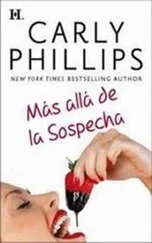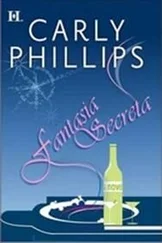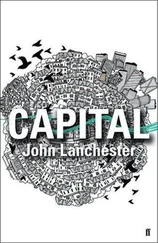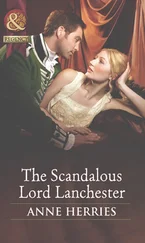As he comes out of his Tube train at Embankment, Mr Phillips can feel the pint of beer being shaken up inside him along with everything else he has eaten that day to make a giant cocktail of lager and porridge and bacon and scallops and G and T and coffee and banana and fish cake. Presumably the contents of your stomach look like what comes out of you when you are sick. That thought, the bubbles in the lager and the jolting action of the train help Mr Phillips to feel mildly but definitely nauseated. Mr Phillips lets the flow of commuters sweep him up the escalator, on to the concourse. He comes out of the station, out across the place in front where taxis and passengers mingle, and heads down the alley at the side towards the footbridge over the Thames. There are always a good few beggars about and today is no exception.
The pedestrian bridge is one of Mr Phillips’s favourites. He likes its narrowness and air of fragility, the way it makes him feel as if he is hanging in the air above the river.
This is the next-to-last leg of his journey home, and in an ideal world Mr Phillips would stop for a look at the river, but with single files of people hurrying over the narrow bridge in both directions it isn’t really possible, so he passes on at a slightly too quick walk and arrives breathless on the South Bank. As always it looks like an unlovely concrete animal sprawled out in death. He crosses the walkway, past an immensely unflattering bust of Nelson Mandela, and heads towards the train station. This is as close as he usually gets to the National Theatre; in fact, Mr Phillips has only ever been in the building once, to go and see King Lear when Martin was studying it for A-level. Mrs Phillips set the trip up and then disloyally but genuinely came down with flu that same morning. Mr Phillips, with a sense that he was behaving very well, volunteered to go instead. In retrospect he sees it as one of the longest four hours of his life, uncannily similar, in the sensation of discomfort, anxiety and pure duration, to that of waiting in Casualty.
‘What did you think?’ he risked asking Martin afterwards, on the way back to the car park. This was a scruffy patch of nothing land which by itself proved that you were now in South London, since car parks in North London were all claustrophobically underground or elaborately above, with ramps and lifts and one-way signs. The two Phillipses had agreed to award themselves a McDonalds on the way home.
‘It was long,’ said Martin. ‘It’s always long.’
‘I felt sorry for the man who had to take all his clothes off,’ said Mr Phillips.
‘Edgar,’ said Martin. ‘Small cock, too.’
*
Mr Phillips emerges from the overground tunnel into the main station concourse at Waterloo. One of the nice things about the way it’s all changed in the last couple of decades is the sudden arrival here of dinky shops, where you can buy not just a newspaper, as you always could, but flowers and chocolates and compact discs, and there is also a whole shop devoted to interesting socks, and another to cappuccino, and now you can even go downstairs on an impulse and get on a train to Paris or Brussels, just like that. In three and a bit hours he could be in a café on the left bank of the Seine wearing a beret, making gnoghi gnoghi noises and eating horsemeat and chips. Or he could be in Brussels eating whatever it was Belgians ate. He could learn the language, get a job as an accountant specializing in multilingual transactions, companies that sold lingerie to the British or spark plugs to the French or whatever. The system couldn’t be that different, the whole point about double entry bookkeeping was that it was the same wherever you went. He would do well over there, they would like his style and be charmed by Mrs Phillips — so unpretentious — so natural — and she plays like an angel! He would have an apartment in the middle of Paris, because the French tended to live in flats, and a little house in the country, Normandy perhaps, with a neighbour who kept an eye on things and whom he paid biannually in his famous home-made cider. Or alternatively he could become a tramp, only a French tramp, cadging francs for Gauloises and rough wine. Probably he would gravitate southwards where the weather was better. He could buy a packet of chalk and do drawings on the pavement. He could have a little French dog for company. If he went and got out the maximum on his credit card now, and then drew the maximum from his bank account, and bought a ticket for Paris, and tried to disappear, how far would I get, Mr Phillips wonders? How determined did you have to be if you wanted your life never to catch up with you?
There is something comforting about the huge board of departures above the main platform concourse. Not just Clapham Junction but Wimbledon, Sutton, Godalming, Putney Heath, Southfields, Queenstown Road, Southampton, Portsmouth. All these places which to somebody are a synonym for Home. Waterloo in the morning is an anxious place, full of the late-for-work, whereas at the end of the day, though it is just as full of people who are hurrying just as hard, for Mr Phillips it seems obscurely comfy.
There is a Clapham Junction train from platform four, ultimate destination Portsmouth, at three minutes past six, and another four minutes after that. The platform will close thirty seconds before departure because that way more people miss the train. Mr Phillips none the less decides to take a chance on trying to catch the 6.03 and breaks into a portly, shuffling half-jog. He must have taken more exercise today than in the whole of the previous year. Others of a similar mind are making a similar last-minute dash, and Mr Phillips is overtaken by a woman in a short tan skirt and a man wearing, for some reason, a raincoat of the same colour. They are giggling and holding hands, as they run down the platform and hop on the second carriage. Good luck to them. In Mr Phillips’s experience so many people avoid the nearest carriage on the assumption that it will be the most full, and instead get into the next carriage along, or even the next but one, that it is often those carriages which are the fullest whereas the nearest carriage is in fact, relatively speaking, reasonably empty. As you get older you make up in cunning for what you lose in speed.
Mr Phillips gets into the first carriage and takes the penultimate available seat, choosing the space beside a plump, affluent-looking man in a business suit in preference to the space beside a girl who is chewing gum and looking either out of the window or at her own reflection. She looks like an eighteen year old who looks like a fifteen year old, with off-blonde hair, puppy-fat cheeks and a full, slightly sulky mouth: a dirty old man’s type of girl. Mr Phillips wants to sit beside her but senses that his reasons for doing so would be too transparent; plus, he is worried about being smelly. Plus the seat he opted for has a discarded copy of the Evening Standard on it.
Two paces behind him a thirty to fortyish man who looks like he works in the City comes in behind Mr Phillips and takes the seat beside the girl. He doesn’t seem to notice her. He is carrying a briefcase and a carrier bag, which he opens to produce a bottle of wine wrapped in tissue paper. He gingerly takes the paper off the wine and, holding the bottle up on his knees, begins reading, or at least looking at, the label, in an apparent trance of reverent concentration.
With gratifying punctuality, the train doors squeal an alarm and then wheeze shut. There is a jolt and they begin to move out from underneath the train shed, past the spaghetti tangle of tracks outside the station, where there is a sudden expansion of the view out over South London, mainly low buildings with the occasional ugly office complex or disastrous sixties tower block. On working days this was just about Mr Phillips’s favourite moment in the whole twenty-four hours: the last leg of his trip home. Even as a boy his favourite journey had been the trip home, and his best moment in any excursion the point at which the outward leg of the expedition was over and they turned back to base. That feels less true today. He can’t claim to be particularly looking forward to getting home and the prospect of an evening in front of the telly doing more or less nothing.
Читать дальше
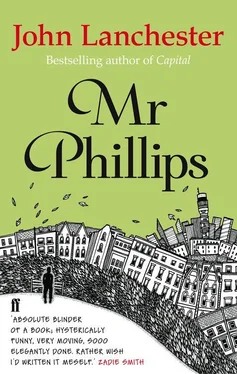



![Unknown - [Carly Phillips] The Bachelor (The Chandler Brothe(Bookos.org) (1)](/books/174132/unknown-carly-phillips-the-bachelor-the-chandle-thumb.webp)

